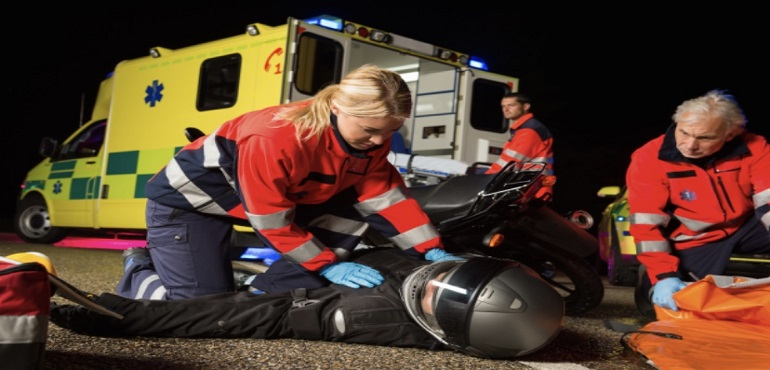| Toll Free : 1844 495 7333(injury hotline- new cases only) | |
| Text a Personal Injury Lawyer 24/7 and get instant help.TM (416 931 5015) | |
| Head Office : 905 495 7333 |
Motor Vehicle Collision Effects that could be Legally Represented
October 21, 2015Motor vehicle collisions could be very minor with no injuries or scratches except on the vehicles but serious collisions could involve heavy crashes with total destruction of the vehicle and even the robbing of human lives. In between these extremes would be a host of traumatic disorders that may not be identified or noticed at the point of the accident until a while later. These are termed post-traumatic stress disorders with whiplash a very common ailment following a motor vehicle collision.
The sequence of events impacting the accident victims reveals the complexity of human emotions which makes it difficult for even experienced pain specialists to diagnose accurately the malady for the right treatment to be administered. Hence, the accident victim is prone to a myriad of undesirable and discomforting health consequences following any motor vehicle accident.
Post-traumatic Stress Disorders
This mental health condition could creep in subtly on 10% of car accidents survivors impacted with a physical injury. Such an injury could be reflected through intermittent physical illness and unresolved chronic pain despite having applied various medical treatments and medications.
Some of the symptoms of PTSD include:
- post-traumatic headache
- whiplash
- surfacing chronic pain
- involuntary intrusive thoughts
- discomforting dreams or images of traumatic events
- physiological hyper-arousal that includes lack of concentration, increased irritability and insomnia
- decreased interests in normal life activities
- emotional numbness or lack of responses
PTSD is increasingly complex as it could be construed as:
- a traumatically induced fear condition
- appraisals of danger by patients
- personal incompetence
- social rejection
- negative emotional responses
By medical definition, PTSD is the term given to the diagnosis on distressed individuals exposed to some traumatic life threatening event that could impact their physical well-being. When individuals are diagnosed to be afflicted with PTSD, 3 obvious symptoms are consistent:
1) Re-experiencing a trauma
2) Emotional numbing or avoidance attitude
3) Hyper-arousal symptoms
When these symptoms have been identified for at least a month, the patient is confirmed with PTSD condition and medical specialists may correct previous diagnostic errors including:
- failure in identifying previous traumatic events in the patient’s life
- over-emphasis on one symptom that stands out without a full symptomatic review
- a quick conclusion to an obvious and potential source for the symptoms in a confirmatory bias
- failure to review other aspects of the patient’s life such as related work or social disability that could be an instrumental factor
Well-designed studies in this area show a conditional prevalence between 11% and 12% while higher percentages surface with consecutive admissions and symptomatic revelations without satisfying the full diagnostic criteria.
The After-Effects of PTSD
It is possible to have serious repercussions on PTSD conditions if left untreated with a natural course taken. A high percentage of PTSD patients may be diagnosed within the first 4 months after the motor vehicle collision and appropriate treatment may have been activated to arrest the disorder with a rapid remission.
Proper medical treatments could assist half or more PTSD patients to make a complete recovery within a year. If PTSD is not aptly and quickly diagnosed and rectified with the proper medical treatments, long term ill effects could be experienced. These include:
- musculoskeletal complaints
- digestive and neurologic discomfort
- chest pains
- ENT issues
- cardiovascular and pulmonary stresses
A long history of PTSD could lead to a higher risk of chronic pain as well as other somatic conditions. Whiplash pains are common complaints in MVC survivors with traumatic headaches and depressive symptoms especially when general medical care is administered.
Legal Assistance on PTSD
Many MVC survivors suffer in silence without exercising their full basic rights to appropriate compensations from relevant parties that are instrumental in causing their condition. They fail to understand the severity of their personal health condition for the long term while being a burden to self, their loved ones and society. However, skilled personal injury lawyers like us have the right experience in handling such cases successfully.
Our Ontario lawyers are licensed car accident lawyer specialists who are well versed with not only the accident legal undertakings but the after-effects of such incidents on the MVC survivors. Our legal firm has excellent short-term and long-term disability claims lawyers who are meticulous in identifying the right sources for fair compensations due to the MVC survivor clients.
Our free consultation injury lawyer counsels the MVC survivor clients professionally in all legal issues on this post-traumatic disorder for the best course of legal action and outcome.
If you, your family or a friend has been injured in an accident, please feel free to speak to one of our injury lawyers for a free consultation about how we are able to assist in making a personal injury claim. We consult in all cities across Ontario with a no win no fee guarantee. Our personal injury lawyers have helped victims secure millions of dollars in personal injury cases. Call us Toll Free On our 24/7 Injury Hotline: 1 – 844 495 7333.
Motor Vehicle Collision Effects that could be Legally Represented
October 21, 2015Motor vehicle collisions could be very minor with no injuries or scratches except on the vehicles but serious collisions could involve heavy crashes with total destruction of the vehicle and even the robbing of human lives. In between these extremes would be a host of traumatic disorders that may not be identified or noticed at the point of the accident until a while later. These are termed post-traumatic stress disorders with whiplash a very common ailment following a motor vehicle collision.
The sequence of events impacting the accident victims reveals the complexity of human emotions which makes it difficult for even experienced pain specialists to diagnose accurately the malady for the right treatment to be administered. Hence, the accident victim is prone to a myriad of undesirable and discomforting health consequences following any motor vehicle accident.
Post-traumatic Stress Disorders
This mental health condition could creep in subtly on 10% of car accidents survivors impacted with a physical injury. Such an injury could be reflected through intermittent physical illness and unresolved chronic pain despite having applied various medical treatments and medications.
Some of the symptoms of PTSD include:
- post-traumatic headache
- whiplash
- surfacing chronic pain
- involuntary intrusive thoughts
- discomforting dreams or images of traumatic events
- physiological hyper-arousal that includes lack of concentration, increased irritability and insomnia
- decreased interests in normal life activities
- emotional numbness or lack of responses
PTSD is increasingly complex as it could be construed as:
- a traumatically induced fear condition
- appraisals of danger by patients
- personal incompetence
- social rejection
- negative emotional responses
By medical definition, PTSD is the term given to the diagnosis on distressed individuals exposed to some traumatic life threatening event that could impact their physical well-being. When individuals are diagnosed to be afflicted with PTSD, 3 obvious symptoms are consistent:
1) Re-experiencing a trauma
2) Emotional numbing or avoidance attitude
3) Hyper-arousal symptoms
When these symptoms have been identified for at least a month, the patient is confirmed with PTSD condition and medical specialists may correct previous diagnostic errors including:
- failure in identifying previous traumatic events in the patient’s life
- over-emphasis on one symptom that stands out without a full symptomatic review
- a quick conclusion to an obvious and potential source for the symptoms in a confirmatory bias
- failure to review other aspects of the patient’s life such as related work or social disability that could be an instrumental factor
Well-designed studies in this area show a conditional prevalence between 11% and 12% while higher percentages surface with consecutive admissions and symptomatic revelations without satisfying the full diagnostic criteria.
The After-Effects of PTSD
It is possible to have serious repercussions on PTSD conditions if left untreated with a natural course taken. A high percentage of PTSD patients may be diagnosed within the first 4 months after the motor vehicle collision and appropriate treatment may have been activated to arrest the disorder with a rapid remission.
Proper medical treatments could assist half or more PTSD patients to make a complete recovery within a year. If PTSD is not aptly and quickly diagnosed and rectified with the proper medical treatments, long term ill effects could be experienced. These include:
- musculoskeletal complaints
- digestive and neurologic discomfort
- chest pains
- ENT issues
- cardiovascular and pulmonary stresses
A long history of PTSD could lead to a higher risk of chronic pain as well as other somatic conditions. Whiplash pains are common complaints in MVC survivors with traumatic headaches and depressive symptoms especially when general medical care is administered.
Legal Assistance on PTSD
Many MVC survivors suffer in silence without exercising their full basic rights to appropriate compensations from relevant parties that are instrumental in causing their condition. They fail to understand the severity of their personal health condition for the long term while being a burden to self, their loved ones and society. However, skilled personal injury lawyers like us have the right experience in handling such cases successfully.
Our Ontario lawyers are licensed car accident lawyer specialists who are well versed with not only the accident legal undertakings but the after-effects of such incidents on the MVC survivors. Our legal firm has excellent short-term and long-term disability claims lawyers who are meticulous in identifying the right sources for fair compensations due to the MVC survivor clients.
Our free consultation injury lawyer counsels the MVC survivor clients professionally in all legal issues on this post-traumatic disorder for the best course of legal action and outcome.
If you, your family or a friend has been injured in an accident, please feel free to speak to one of our injury lawyers for a free consultation about how we are able to assist in making a personal injury claim. We consult in all cities across Ontario with a no win no fee guarantee. Our personal injury lawyers have helped victims secure millions of dollars in personal injury cases. Call us Toll Free On our 24/7 Injury Hotline: 1 – 844 495 7333.








